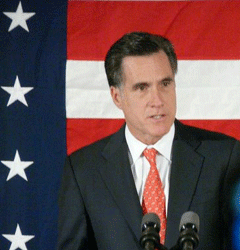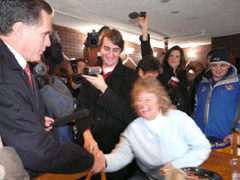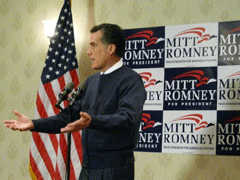Revealing Romney
Air Date: Week of January 11, 2008

(Photo: Bruce Gellerman)
Living on Earth’s Bruce Gellerman tails Mitt Romney on the campaign trail in New Hampshire. He also looks at Romney’s environmental record as governor of Massachusetts and his surprising last minute rejection of the Regional Greenhouse Gas Initiative, a market-driven system to control greenhouse gasses in the Northeast.
Transcript
CURWOOD: Just ahead—presidential hopeful Mitt Romney and the environment. Stay tuned to Living on Earth.
CURWOOD: It’s Living on Earth. I’m Steve Curwood. Throughout the presidential campaign Living on Earth has been examining the energy and global warming policies of the candidates. Today we turn to Republican and former Massachusetts Governor Mitt Romney.
Living On Earth’s Bruce Gellerman went on the campaign trail with Governor Romney during the recent New Hampshire primary, and has this report.
GELLERMAN: By his own count Mitt Romney made hundreds of campaign appearances in New Hampshire.
[SOUND OF LOTS OF PEOPLE TALKING IN GATHERING]
Most were of the meet-and-greet variety like this one at Norton’s Classic Restaurant in Nashua, where you can sit in a blue and pink booth fashioned out of a 1950’s T-bird. With reporters and photographers in tow, Romney makes the rounds.
ROMNEY: Well there are a couple of things. One is—my view—is that families ought to be able to save their money tax-free.
GELLERMAN: At this stop just two people were interested in talking about the environment. Eight-year-old Nick Gage and his dad Kevin. Nick just finished a school report on global warming.
NICK GAGE: Well I learned that if we don’t save the polar bears and like, put them in a colder place they’ll probably die off.

Kevin, Nick and Alex Gage at Norton's Classic Restaurant in Nashua, NH (Photo: Bruce Gellerman)
KEVIN GAGE: I think global warming is an important issue. It’s not number one on my list. We actually just bought a car, but we couldn’t afford to get into a hybrid, which was really kind of stinky. With kids we couldn’t do the Prius because it’s you know, you couldn’t do it.
GELLERMAN: Likewise, for Mitt Romney, global warming isn’t so much an environmental issue as an economic and national security issue. Here he’s answering a question at one of his ‘Ask Mitt Anything’ meetings in Hudson, New Hampshire.
ROMNEY: I believe the planet’s getting warmer and I believe that human activity is contributing to the planet getting warmer. I’m not a scientist so I don’t know how much is human and how much is due to other cyclical factors we don’t understand. I just don’t know.
But I do know this; we can reduce the impact of human activity by reducing our emissions of greenhouse gases. And the best way I know to do that is to put us on a track to becoming energy independent of foreign oil. Because getting us to do that would mean less use of oil and more use of liquefied coal, where you sequester the CO2, nuclear, solar, wind power, biodiesel, biofuel, ethanol, cellulosic ethanol, and more efficient vehicles and homes and business. You do those things: our greenhouse gas emissions come down a lot.

This supporter went for the mitt. (Photo: Bruce Gellerman)
ROMNEY: We use too much foreign oil. We send about a billion dollars a day now out of our country to buy oil from other people. That billion a day could be invested here. But instead it’s going out there—to Ahmadinejad, and Chavez and Putin and others—some of whom use it against us.
GELLERMAN: Romney supports drilling for oil in ANWR, the Alaskan National Wildlife Refuge, and in off-shore coastal waters—but not near Florida. And he opposes the Kyoto Climate Accord because it doesn’t require developing countries to cap their climate changing emissions.
Romney is for improving the efficiency of automobiles but opposes mandates requiring carmakers to increase gas mileage. He wants to recycle nuclear waste but is waiting for the latest scientific studies before taking a position on the controversial Yucca Mountain nuclear waste site in Nevada.

Working the crowd in New Hampshire. (Photo: Bruce Gellerman)
ROMNEY: This is not something that’s going to get solved in ten years. We can't become energy independent in ten years, but we can get ourselves on a track to do that. It's going to require a far more substantial investment by our nation in energy technology. Right now, we spend about $4 billion a year on new sources of energy and energy efficiency. We're going to have to increase that dramatically.
GELLERMAN: On the campaign trail Romney is a consummate politician—hand outstretched, sporting a smile with a quick wit and ready quip. He’s fond of quoting Yogi Berra.
ROMNEY: Did you have a good breakfast? It’s a little crowded in here now. What is it that Yogi Berra said, which is ‘the place is so crowded nobody goes there anymore.’
GELLERMAN: If Yogi Berra were a reporter trying to learn about Romney’s environmental record, he might say ‘you can learn a lot about history by studying the past.’ So, I found people familiar with Mitt Romney’s environmental record when he was governor of Massachusetts. Sonia Hamel worked as a senior official in various state environmental offices for 25 years, under seven governors.
HAMEL: Actually Governor Romney is a wonderful manager. He was a very metrics-oriented manager and I think he was good at that.
GELLERMAN: Romney managed the Governor’s Office like the businessman he was and won praise from environmentalists for filing first-in-the nation legislation to protect coastal waters. He signed a bill phasing out mercury in consumer products, and brokered a deal to clean up the state’s dirtiest power plants. Romney even weather stripped the windows in his home, saving $128 a year on his heating bill.
But he got the highest praise for creating a new cabinet position overseeing energy, transportation, housing and the environment and appointing the president of the Conservation Law Foundation—an ardent environmental advocate—as its head.
The move pleased George Bachrach, president of the Environmental League of Massachusetts and a former Democratic state senator.
BACHRACH: I think many of us in the state were excited by Mitt Romney. We may not have agreed with him on issues. He may not have been our cup of tea in many ways but we were impressed by his degree of intellect, entrepreneurial spirit, reform-minded, fresh set of eyes, and I think many of us were greatly disappointed when he became something else.
GELLERMAN: Critics say the transformation of Mitt Romney took a few years. Romney—who said he supported wind power—joined forces with opponents, including Ted Kennedy, against a wind project off Cape Cod. He cut the state’s environmental budget, and spending on parks and land preservation.

Mitt Romney delivers a speech on the campaign trail in N.H. (Photo: Bruce Gellerman)
HAMEL: In my 25 years of doing program development in state government I never had been involved in a program as well analyzed and as well modeled as RGGI. We spent three years designing it and had a great deal of certainty that price increases would be extremely modest—probably on the order of two or three percent. And that actually if we did good work on energy efficiency we could reduce that to having no price increase.
GELERMAN: Romney had whole-heartedly supported the regional curb on greenhouse gases. In November of 2005 he said—quote: ‘this is a great thing for the Commonwealth. I’m convinced it’s good for business.’
Then, suddenly, just a month later, on the same day he announced he wasn’t seeking re-election, Governor Romney said he was withdrawing from RGGI. Here’s Romney explaining his change of heart on New Hampshire public radio’s program the Exchange:
ROMNEY: I had literally one of our largest employers tell me they would not build another facility in our state if we signed the bill as it was without a cap. So I insisted that the other parties put a cap in. The other states would not and I said, very simple: ‘if the other states aren’t going to allow us to have a cap I can’t sign it.’
GELLERMAN: Again, Sonia Hamel, the Massachusetts official who negotiated the greenhouse agreement:
HAMEL: I was personally really surprised and disappointed because we had done our homework on that program and it was designed very cautiously. So yes, it was a terrible disappointment to me.
GELLERMAN: So, what happened? What changed?
HAMEL: I can’t tell you exactly. I wish I could look into the mind of Governor Romney when he was making these decisions but he faltered. In terms of making the decision he listened a lot to scare tactics. I don’t know.
GELLERMAN: The upcoming Michigan primary could be the make or break vote for Mitt Romney. The role his environmental record and platform will play won’t be known until the votes are analyzed, or as Yogi Berra would say; ‘it ain’t over til it’s over.’ For Living on Earth I’m Bruce Gellerman.
Links
Living on Earth wants to hear from you!
Living on Earth
62 Calef Highway, Suite 212
Lee, NH 03861
Telephone: 617-287-4121
E-mail: comments@loe.org
Newsletter [Click here]
Donate to Living on Earth!
Living on Earth is an independent media program and relies entirely on contributions from listeners and institutions supporting public service. Please donate now to preserve an independent environmental voice.
NewsletterLiving on Earth offers a weekly delivery of the show's rundown to your mailbox. Sign up for our newsletter today!
 Sailors For The Sea: Be the change you want to sea.
Sailors For The Sea: Be the change you want to sea.
 The Grantham Foundation for the Protection of the Environment: Committed to protecting and improving the health of the global environment.
The Grantham Foundation for the Protection of the Environment: Committed to protecting and improving the health of the global environment.
 Contribute to Living on Earth and receive, as our gift to you, an archival print of one of Mark Seth Lender's extraordinary wildlife photographs. Follow the link to see Mark's current collection of photographs.
Contribute to Living on Earth and receive, as our gift to you, an archival print of one of Mark Seth Lender's extraordinary wildlife photographs. Follow the link to see Mark's current collection of photographs.
 Buy a signed copy of Mark Seth Lender's book Smeagull the Seagull & support Living on Earth
Buy a signed copy of Mark Seth Lender's book Smeagull the Seagull & support Living on Earth

